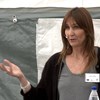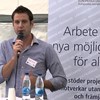folk

Folke Tersman
At the Institute for Futures Studies I serve as Deputy Director, supporting both the Director and the managers in Organizational support. Besides working at the Institute for Futures Studies (IFFS) I a

Martin Kolk
I am a demographer with an interest in all major demographic processes (fertility, mortality, union formation, and migration), often with an intergenerational component. I am also interested in if the
Sanna Wolk and Leif Dahlberg: The sustainable teacher
Research seminar with Sanna Wolk, professor of law, president of the union SULF, and Leif Dahlberg, professor of media technology at Royal School of Technology (KTH). Register here AbstractThe goal is tJoin the seminar online or at the Institute for Futures Studies. If you plan to join on site, please check the box in the registration form.

Hur vet vi om arbetsmarknadspolitiken verkligen fungerar? Seminarium i Almedalen 2012 del 1
Hur vet vi om arbetsmarknadspolitiken verkligen fungerar? Under Almedalsveckan, 5 juli 2012 höll Institutet för Framtidsstudier ett seminarium om hur det är möjligt att utvärdera insatser som har till

Martin Kolk: Low-fertility countries are responsible for almost all of the CO2 emissions
Do we need to reduce population growth to address the climate challenge? From the perspective that each person contributes to green house gas emissions and resource consumption, it is a logical though

Hur vet vi om arbetsmarknadspolitiken verkligen fungerar? IF i Almedalen 2012 del 2
Alme2 Forskare Lena Nekby och utvärderare Joakim Tranquist, moderator Johanna Kronlid. Hur vet vi om arbetsmarknadspolitiken verkligen fungerar? Under Almedalsveckan, 5 juli 2012 höll Institutet för

Offentliga samtal: Vem ska anställa alla hundraåringar?
I Sverige har antalet hundraåringar mer än fördubblats sedan år 2000 och lär fördubblas inom de närmaste tjugo åren. Det talas om att höja pensionsåldern, men på arbetsmarknaden efterfrågas folk under 40 år. Så vad ska alla friska åldringar sysselsätta sig med? Hur länge kan vi faktiskt arbeta utan att förlora i skärpa?
Debunking and Disagreement
Noûs, (Early View), DOI: 10.1111/nous.12135. Introduction A familiar way of supporting skeptical doubts about the beliefs in some area, such as ethics orreligion, is to provide a “debunking argument” agaiway is to appeal to the disagreement that occurs in the area.2 These types of challenge areoften treated separately and there is not much overlap in the literature they have given rise to.Yet, as they pursue the same conclusion—that the target beliefs are not (fully) justified andthat we should reduce our confidence in them—one might well wonder how they are related.Are they entirely independent or do they interact in non-trivial and interesting ways? That isthe question I shall explore.
Review of A World Without Values. Essays on John Mackie’s Moral Error Theory
Joyce, R., and Kirchin, S. (eds.) (Springer, 2010) in International Journal for the Study of Skepticism 5, 2015, 333-337. DOI: 10.1163/22105700-05031197
Recent Work on Reflective Equilibrium and Method in Ethics
Philosophy Compass 13 (6), 2018. DOI:10.1111/phc3.12493. Abstract The idea of reflective equilibrium (IRE) remains the most popular approach to questions about method in ethics, despite the masses of cr








